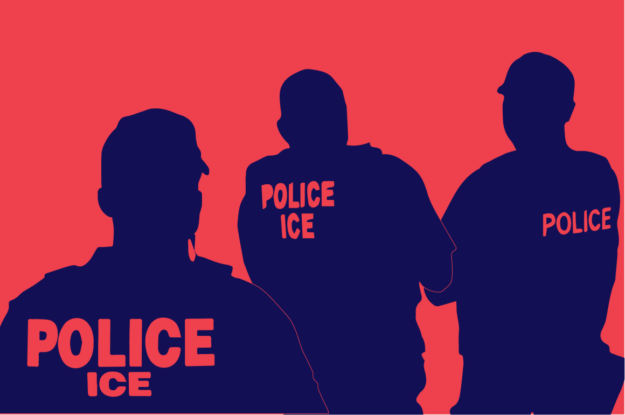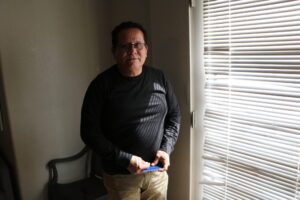Widgetized Section
Go to Admin » Appearance » Widgets » and move Gabfire Widget: Social into that MastheadOverlay zone
Trump anti-immigrant policies add to Latino mental health crisis in Colorado ski towns

The potential for stepped up ICE raids is causing mental health issues among Latino residents in Colorado ski towns (ACLU Texas image).
Editor’s note 1: This story comes to RealVail.com from KFF Health News.
SILVERTHORNE, Colo. — When Adolfo Román García-Ramírez walks home in the evening from his shift at a grocery store in this central Colorado mountain town, sometimes he thinks back on his childhood in Nicaragua. Adults, he recollects, would scare the kids with tales of the “Mona Bruja,” or “Monkey Witch.” Step too far into the dark, they told him, and you might just get snatched up by the giant monstrous monkey who lives in the shadows.
Now, when García-Ramírez looks over his shoulder, it’s not monster monkeys he is afraid of. It’s U.S. Immigration and Customs Enforcement officers.
“There’s this constant fear that you’ll be walking down the street and a vehicle rolls up,” García-Ramírez, 57, said in Spanish. “They tell you, ‘We’re from ICE; you’re arrested,’ or, ‘Show me your papers.’”
Silverthorne, a commuter town between the ski meccas of Breckenridge and Vail, has been García-Ramírez’s home for the past two years. He works as a cashier at the grocery and shares a two-bedroom apartment with four roommates.
The town of nearly 5,000 has proved a welcome haven for the political exile, who was released from prison in 2023 after Nicaragua’s authoritarian government brokered a dealwith the U.S. government to transfer more than 200 political prisoners to the U.S. The exiles were offered temporary residency in the U.S. under a Biden administration humanitarian parole program.

García-Ramírez’s two-year humanitarian parole expired in February, just a few weeks after President Donald Trump issued an executive order to end the program that had permitted temporary legal residency in the U.S. for hundreds of thousands of Cubans, Haitians, Nicaraguans, and Venezuelans, putting him at risk of deportation. García-Ramírez was stripped of his Nicaraguan citizenship when he came to the U.S. Just over a year ago, he applied for political asylum. He is still waiting for an interview.
“I can’t safely say I’m calm, or I’m OK, right now,” García-Ramírez said. “You feel unsafe, but you also feel incapable of doing anything to make it better.”
Vail and Breckenridge are world famous for their ski slopes, which attract millions of people a year. But life for the tourism labor force that serves Colorado’s mountain resorts is less glamorous. Residents of Colorado’s mountain towns experience high rates of suicideand substance use disorders, fueled in part by seasonal fluctuations in income that can cause stress for many in the local workforce.
The Latino communities who make up significant proportions of year-round populations in Colorado’s mountain towns are particularly vulnerable. A recent poll found more than 4 in 5 Latino respondents in the Western Slope region, home to many of the state’s rural ski resort communities, expressed “extremely or very serious” concern about substance use. That’s significantly higher than in rural eastern Colorado’s Morgan County, which also has a sizable Latino population, and in Denver and Colorado Springs.
Statewide, concerns about mental health have surged among Latinos in recent years, rising from fewer than half calling it an extremely or very serious problem in 2020 to more than three-quarters in 2023. Health care workers, researchers, and community members all say factors such as language differences, cultural stigma, and socioeconomic barriers may exacerbate mental health issues and limit the ability to access care.
“You’re not getting regular medical care. You’re working long hours, which probably means that you can’t take care of your own health,” said Asad Asad, a Stanford University assistant professor of sociology. “All of these factors compound the stresses that we all might experience in daily life.”
Add sky-high costs of living and an inadequate supply of mental health facilities across Colorado’s rural tourist destinations, and the problem becomes acute.
Now, the Trump administration’s threats of immigration raids and imminent deportation of anyone without legal U.S. residency have caused stress levels to soar. In communities around Vail, advocates estimate, a vast majority of Latino residents do not have legal status. Communities near Vail and Breckenridge have not experienced immigration raids, but in neighboring Routt County, home to Steamboat Springs, at least three people with criminal records have been detained by ICE, according to news reports. Social media posts falsely claiming local ICE sightings have further fueled concerns.
Into the shadows
Yirka Díaz Platt, a bilingual social worker in Silverthorne originally from Peru, said a pervasive fear of deportation has caused many Latino workers and residents to retreat into the shadows. People have begun to cancel in-person meetings and avoid applying for government services that require submitting personal data, according to local health workers and advocates. In early February, some locals didn’t show up to work as part of a nationwide “day without immigrants” strike. Employers wonder whether they will lose valuable employees to deportation.
Some immigrants have stopped driving out of fear they will be pulled over by police. Paige Baker-Braxton, director of outpatient behavioral health at the Vail Health system, said she has seen a decline in visits from Spanish-speaking patients over the last few months.
“They’re really trying to keep to themselves. They are not really socializing much. If you go to the grocery stores, you don’t see much of our community out there anymore,” Platt said. “There’s that fear of, ‘No, I’m not trusting anyone right now.’”
Juana Amaya is no stranger to digging in her heels to survive. Amaya immigrated to the Vail area from Honduras in 1983 as a single mother of a 3-year-old and a 6-month-old. She has spent more than 40 years working as a house cleaner in luxury condos and homes around Vail, sometimes working up to 16 hours a day. With barely enough time to finish work and care for a family at home, she said, it is often hard for Latinos in her community to admit when the stress has become too much.
“We don’t like to talk about how we’re feeling,” she said in Spanish, “so we don’t realize that we’re dealing with a mental health problem.”
Support groups
The current political climate has only made things worse.
“It’s had a big impact,” she said. “There are people who have small children and wonder what they’ll do if they’re in school and they are taken away somewhere, but the children stay. What do you do?”
Asad has studied the mental health impacts of deportation rhetoric on Latino communities. He co-authored a study, published last year in the journal Proceedings of the National Academy of Sciences, that found escalated deportation rhetoric may cause heightened levels of psychological distress in Latino noncitizens and even in Latino citizens.
Asad found that both groups may experience increased stress levels, and research has borne out the negative consequences of a parent’s lack of documentation on the health and educational attainment of their children.
“The inequalities or the hardships we impose on their parents today are the hardships or inequalities their children inherit tomorrow,” Asad said.
Despite heightened levels of fear and anxiety, Latinos living and working near Vail still find ways to support one another and seek help. Support groups in Summit County, home to Breckenridge and less than an hour’s drive from Vail, have offered mental health workshops for new immigrants and Latina women. Building Hope Summit County and Olivia’s Fund in Eagle County, home to Vail, help those without insurance pay for a set number of therapy sessions.
Vail Health plans to open a regional inpatient psychiatric facility in May, and the Mobile Intercultural Resource Alliance provides wraparound services, including behavioral health resources, directly to communities near Vail.
Back in Silverthorne, García-Ramírez, the Nicaraguan exile, takes things one day at a time.
“If they deport me from here, I’d go directly to Nicaragua,” said García-Ramírez, who said he had received a verbal death threat from authorities in his native country. “Honestly, I don’t think I would last even a day.”
In the meantime, he continues to make the routine trek home from his cashier job, sometimes navigating slick snow and dark streets past 9 p.m. When nightmarish thoughts about his own fate in America surface, García-Ramírez focuses on the ground beneath his feet.
“Come rain, shine, or snow,” he said, “I walk.”
Editor’s note 2: This article was published with the support of the Journalism & Women Symposium (JAWS) Health Journalism Fellowship, assisted by grants from The Commonwealth Fund. KFF Health News is a national newsroom that produces in-depth journalism about health issues and is one of the core operating programs at KFF — the independent source for health policy research, polling, and journalism.


